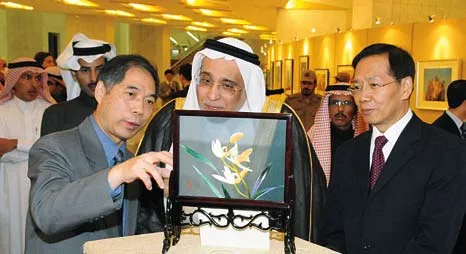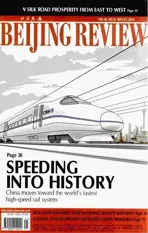Building a New Silk Road
2010-09-12ByWANGJINGLIE
By WANG JINGLIE
Building a New Silk Road
By WANG JINGLIE
China and Arab countries sort out programs for further mutual growth

CoURteSY oF WANg JINgLIe
China expects to win a favorable external environment for its domestic development—an international environment of lasting stability, good relations with neighboring countries, an environment of international cooperation based on equality and mutual beneft, and an atmosphere of objective and friendly international public opinion.
Arab countries achieved national liberation and independence before, during and after World War II. But over the following more than half a century, most have been deeply caught in war and turmoil, because of their special international geopolitics and complex historical conditions. They face arduous tasks in nation building, relatively low social and economic development levels, and the threat of further marginalization under the impact of economic globalization. Therefore, development is the most urgent task for Arab countries.
The development of China and Arab countries calls for effective coordination and cooperation, based on mutual understanding and support.
Political trust
Frequent high-level exchanges of visits have been conducted between the two sides. Chinese leaders have visited all Arab countries, and Arab leaders have also visited China frequently. These exchanges have strengthened communication and cooperation in felds spanning politics, economies, science, culture, education, health and sport.
China has established a consultation system between its foreign ministry and those of Arab countries. Through this system, they often discuss issues of common concern. This helps them to enhance understanding, increase consensus and promote cooperation.
Meanwhile, China continues to raise the cooperation to new levels by establishing strategic cooperative partnerships with a number of countries, including Egypt, Saudi Arabia and Algeria.
The China-Arab States Cooperation Forum (CASCF) is a new means of engagement between China and Arab states. It marks the establishment of a new type of partnership between them.
As early as 1998, the League of Arab States passed a resolution on developing Sino-Arab relations in the 21st century. Six years later, in January 2004, the CASCF was established—the inevitable outcome of the development of Sino-Arab relations.
Until now, the CASCF has altogether held seven meetings of senior officials and four ministerial conferences. On May 11, the seventh meeting of the former group was held in Beijing. Two days later, the Fourth CASCF Ministerial Meeting was held in Tianjin, a port city in north China.
Economic cooperation
The differences in economic development levels and industrial structures are greatly complementary between China and Arab states in economic and trade cooperation.
It is the same in the energy feld. China needs oil. And oil-producing Arab states need to sell their oil at an appropriate price and maintain stable customers to obtain longterm, steady and considerable incomes.
The fact that China and Arab countries need each other forms an important condition of further development of win-win economic cooperation. It promises good prospects for economic and trade cooperation between the two sides.
Currently, China has signed economic, trade and technological cooperation agreements with most Arab states. In addition, they have established economic and trade joint committees, and signed investment protection agreements on avoidance of double taxation.
In recent years, Sino-Arab economic and trade exchanges have been very frequent. Bilateral trade volume rose from $36.4 billion in 2004 to $107.4 billion in 2009, while mutual direct investment increased from $1.1 billion to $5.5 billion and contracted projects soared from $13.5 billion to $70 billion. Sino-Arab cooperation now ranges from traditional areas, including finance, energy, construction, transportation, manufacturing and processing industries to new areas such as IT and urban development.
Especially under the impact of the global financial crisis, the healthy expansion of Sino-Arab economic and trade cooperation fully demonstrated huge complementarities and prospects for these economies.
A bright future
Since China established its first diplomatic relations with an Arab country—Egypt—in 1956, a solid foundation has been laid for the development of Sino-Arab relations. Notable achievements have also been made. But under new circumstances, how to raise friendship and cooperation to new levels still requires serious consideration of both sides.

AWESTRUCK: China’s Ambassador to Saudi Arabia Yang Honglin (right) observes an Chinese embroidery work at an exhibition in Riyadh on December 6, 2009, along with a senior official from Saudi Arabia’s Ministry of Culture and Information
The past 65 years since the end of World War Ⅱ have witnessed both China’s and Arab states’ struggles for national liberation, political independence, economic development, social prosperity and good livelihoods.
During the process, the countries chose different development paths based on their own national conditions. All had success stories to tell and lessons to learn.
Big changes have taken place in the current world. The global economy has not yet recovered from the financial crisis. China and Arab states are both faced with severe challenges.
In this context, the Fourth CASCF Ministerial Meeting achieved significant results, including a long-term cooperation framework as well as practical measures.
The two sides agreed to establish a strategic partnership featuring comprehensive cooperation and common development within the framework of the CASCF.
They issued a joint declaration on the establishment of strategic cooperative relations between China and Arab states and a communiqué of the Fourth CASCF Ministerial Meeting. Before and during the meeting, a series of documents, including an action plan for 2010-12 and a memorandum on mutual translation and publication of Chinese and Arabic classics, were signed.
The documents will give guidance and guarantees for the development of Sino-Arab relations in the coming years.
The two sides will promote political mutual trust through strengthening strategic cooperation, intensifying high-level exchanges and strategic consultations, and exchanging governance and development experience.
They will continue to support each other on issues related to their respective core interests and cooperate on major international and regional affairs.
The two sides will cooperate in various fields. These include politics, economies, trade, energy, environmental protection, agriculture, culture and tourism.
China has promised to train 1,000 professionals for Arab states each year during this and the next two years. It reiterated it will continue to support the Arab Peace Initiative, and said it is willing to work together with Arab states and the international community to push for a comprehensive, just and equitable resolution of the Middle East issue.
China and Arab states have reached a consensus on extending economic and trade cooperation and expanding the scale of trade while regulating its order and optimizing its structure.
China will expand imports of non-oil products while stabilizing its trade in oil, natural gas, and products processed from them, with Arab states. Meanwhile, it will increase exports of mechanical, electrical and hi-tech products to Arab states.
Infrastructure construction cooperation will also be promoted. China supports both Chinese and Arabic enterprises’ cooperation in power, railway and highway construction projects. It will further extend bilateral cooperation in fnancial areas and strengthen cooperation with Arab states on environmental protection and combating desertifcation.
On May 11, China and Qatar signed a memorandum of understanding on energy and fnancial cooperation. On the same day, SINOPEC SABIC Tianjin Petrochemical Company, a joint venture of the China Petroleum and Chemical Corporation and the Saudi Basic Industries Corporation, offcially started business.
It is currently the biggest ethylene joint venture in China. The two countries altogether invested approximately $2.68 billion in the cooperative program.
Further, the Sino-Arab economic and trade forum will be held this September in Yinchuan, the capital city of west China’s Ningxia Hui Autonomous Region.
It will cover fve main topics: Sino-Arab investment and trade facilitation and trade development prospects; the development of a joint market access system; prospects for project contracts and labor service cooperation; tourism and cultural development; and the training of professionals for economic, trade and technological cooperation.
The economic and trade forum will become a long-term mechanism and be held every year from now on. It will serve as a platform for Chinese and Arab government officials, entrepreneurs and scholars to expand trade and economic activities.
Cultural exchanges will also be promoted. China and Arab states have signed cultural agreements and a series of action plans within the framework of these agreements.
On May 11, the General Administration of Press and Publication of China signed a memorandum on mutual translation and publication of Chinese and Arabic classics with the Secretariat of the League of Arab States.
China will establish a special committee made up of representatives from government departments as well as publishers. The committee will be responsible for the implementation of specifc projects.
The two sides will launch projects to translate and publish books spanning historical and cultural classics, contemporary literature and children’s books. New and classic texts will be provided for readers on both sides to strengthen communication between the two major and ancient civilizations and construct a Silk Road of modern culture.
Moreover, the second Arab arts festival will be held in Beijing and Shanghai in June.
The author is a research fellow at the Institute of West Asian and African Studies under the Chinese Academy of Social Sciences
